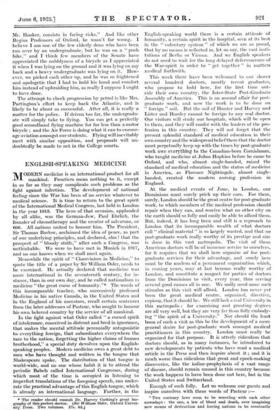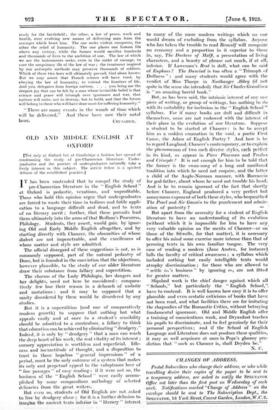ENGLISH-SPEAKING MEDICINE
MODERN medicine is an international product for all ..LY mankind. Frontiers mean nothing to it, except -/- in so far as they may complicate such problems as the fight against infection. The development of national feeling since the War has been of no service whatever to medical science. It is time to return to the great spirit of the International Medical Congress, last held in London in the year 1913. The hero of that occasion, applauded by all alike, was the German-Jew, Paul Ehrlich, the founder of chemotherapy and the creator of salvarsan, or 606. All nations united to honour him. The President, Sir Thomas Barlow, acclaimed the idea of peace, as part of our underlying principles, and declared, alas ! that the prospect of " bloody strife," after such a Congress, was unthinkable. We were to have met in Munich in 1917, and no one knows when we shall meet again.
Meanwhile the spirit of " Chauvinism in Medicine," to quote the title of a paper by Sir William Osler, needs to be exorcised. He actually declared that medicine was more international in the seventeenth century, for in- stance, than in our own day, and he called nationalism in medicine "the great curse of humanity."* The words of this incomparable teacher, who successively professed Medicine in his native Canada, in the United States and in the England of his ancestors, recall certain sentences from the later addresses of Pasteur, who sought to honour his own beloved country by the service of all mankind.
In the fight against what Osler called " a cursed spirit of intolerance, conceived in distrust and bred in ignorance, that makes the mental attitude perennially antagonistic to everything foreign, that subordinates everywhere the race to the nation, forgetting the higher claims of human brotherhood," a special duty devolves upon the English- speaking peoples. Modern medicine owes a great debt to men who have thought and written in the tongue that Shakespeare spake. The distribution of that tongue is world-wide, and no one whose habit it is to attend the periodic Babels called International Congresses, during which most of the time is occupied in listening to imperfect translations of the foregoing speech, can under- rate the practical advantage of this English tongue, which is already an international language. Further, in the * The reader should consult Dr. Harvey Cushing's great bio- graphy of this perfect doctor. (Sir William Oster. Oxford Univer- sity Press. Two volumes. 37s. 6d.) English-speaking world there is a certain attitude of humanity, a certain spirit in the hospital, seen at its best in the " voluntary system " of which we are so proud, that by no means is reflected in, let us say, the vast insti- tutions of Berlin or Vienna. And we English speakers do not need to wait for the long delayed defervescence of the War-spirit in order to " get together " in matters medical forthwith.
This week there have been welcomed to our shores several hundred doctors, mostly recent graduates, who propose to hold here, for the first time out- side their own country, the Inter-State Post-Graduate Assembly of America. This is an annual affair for post- graduate work, and now the work is to be done on " foreign " soil. But the soil of Hunter and Harvey and Lister and Horsley cannot be foreign to any real doctor. Our visitors will study our hospitals, which will be open to them, and they will confei with the leaders of the pro- fession in this country. They will not forget that the present splendid standard of medical education in their own country and the widespread belief there that the doctor must perpetually keep up with the times by post-graduate work owe everything to the Canadian-born Cornishman, who taught medicine at Johns Hopkins before he came to Oxford, and who, almost single-handed, raised the standard of medical education and the status of medicine in America, as Florence Nightingale, almost single- handed, created the modern nursing profession in England.
At the medical events of June, in London, our Dominions must surely prick up their ears. For them, surely, London should be the great centre for post-graduate work, to which members of the medical profession should repair when they can, and receive what no other city on the earth should so fully and easily be able to afford them. But, indeed, it has long been and still is a reproach to London that its incomparable wealth of what doctors call " clinical material " is so largely wasted, and that no post-graduate work really worthy of its prestige and size is done in this vast metropolis. The visit of these American doctors will be of immense service to ourselves, for it requires that we shall here organize ad hoc post- graduate services for their advantage, and surely here must be the nucleus of a permanent organization which, in coming years, may at last become really worthy of London, and constitute a magnet for parties of doctors from the Dominions to visit, every year, thus serving several good causes all in one. We sadly need some such stimulus as this visit will afford. London has never yet been the great medical centre, organized, directive, copious, that it should be. We still lack a real University in this metropolis : for examining and granting degrees are all very well, but they are very far from fully embody- ing " the spirit of a University." Nor should the least boon of such a visit as this be the development of a more general desire for post-graduate work amongst medical practitioners in this country. London must really be organized for that purpose. It is utterly ridiculous that doctors should, as in many instances, be introduced to new developments by patients who have read a medical article in the Press and then inquire about it ; and it is much worse than ridiculous that great and epoch-making discoveries, like the iodine-prophylaxis of a vast range of disease, should remain unused in this country because the work happens to have been done not here, but in the United States and Switzerland.
Enough of such folly. Let us welcome our guests and inspire ourselves with these words of Pasteur :- " Two contrary laws seem to be wrestling with each other nowadays : the one, a law of blood and death, ever imagining new means of destruction and forcing nations to be constantly
ready for the battlefield ; the other, a law of peace, work and health, ever evolving new means of delivering man from the scourges which beset him. The one seeks violent conquests, the other the relief of humanity. The one places one human life above any victory, while the former would sacrifice hundreds and thousands of lives to the ambition of one. The law of which we are the instruments seeks, even in the midst of carnage, to cure the sanguinary ills of the law of war ; the treatment inspired by our antiseptic methods may preserve thousands of soldiers. Which of these two laws will ultimately prevail, God alone knows. But we may assert that French science will have tried, by obeying the law of humanity, to extend the frontiers of life. And you, delegates from foreign nations, . . . you bring me the deepest joy that can be felt by a man whose invincible belief is that science and peace will triumph over ignorance and war, that nations will unite, not to destroy, but to build, and that the future will belong to those who will have done most for suffering humanity."
" There are many events in the womb of time which will be delivered." And these have now their natal















































 Previous page
Previous page